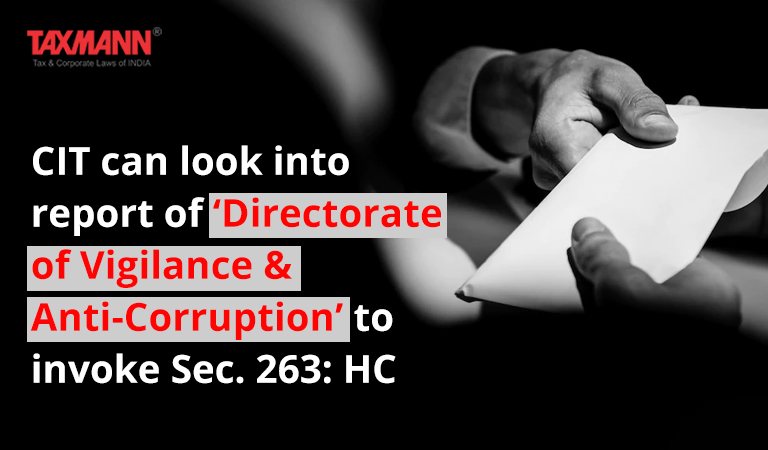CIT can look into report of ‘Directorate of Vigilance & Anti-Corruption’ to invoke Sec. 263: HC
- Blog|News|Income Tax|
- 2 Min Read
- By Taxmann
- |
- Last Updated on 10 January, 2023

Case Details: CIT v. N. Sasikala - [2023] 146 taxmann.com 149 (Madras)
Judiciary and Counsel Details
-
- S. Vaidyanathan & C. Saravanan, JJ.
- Karthik Ranganathan Standing Counsel & S. Rajesh for the Appellant.
- T. Vasudevan Jr. Standing Counsel for the Respondent.
Facts of the Case
Assessee an individual failed to file return of income as per the time mentioned under section 139(1). Subsequently, a notice under section 144 was issued and the assessee filed return of income.
The assessment was completed under section 144 as the assessee failed to furnish any of the documents called for and the return of income was not validly explained in the return filed beyond the stipulated time.
Meanwhile, the Assessing Officer (AO) received a DVAC’s (Directorate of Vigilance and Anti-Corruption) Report in which the assessee was a beneficiary. A copy of the report was sent to AO but he completed the assessment without considering it.
CIT invoked the revision powers under section 263 as AO committed mistake by ignoring DVAC’s report. Against such an order, the assessee preferred an appeal to the tribunal which duly granted relief to the assessee.
ITAT Held
The Tribunal held that the powers under section 263 i.e., the revisionary powers can be exercised by the CIT only based on information available as per the Income Tax Act. DVAC’s report was out of the records and information received under the Income-tax act.
Aggrieved by the order of the Tribunal, the CIT preferred an appeal to the Madras High Court.
The Madras High Court held that the order passed by Tribunal in allowing the assessee’s appeal was unsustainable. The orders passed were prejudicial to the interest of revenue. Further, the Tribunal was at fault not only for passing an impugned order but the Tribunal required to look into the matter and pay attention to the mistakes committed by the AO.
Overlooking of mistakes committed by AO resulted in an erroneous order passed in the favour of the assessee. Therefore, Tribunal erred in allowing the assessee’s appeal.
Disclaimer: The content/information published on the website is only for general information of the user and shall not be construed as legal advice. While the Taxmann has exercised reasonable efforts to ensure the veracity of information/content published, Taxmann shall be under no liability in any manner whatsoever for incorrect information, if any.

Taxmann Publications has a dedicated in-house Research & Editorial Team. This team consists of a team of Chartered Accountants, Company Secretaries, and Lawyers. This team works under the guidance and supervision of editor-in-chief Mr Rakesh Bhargava.
The Research and Editorial Team is responsible for developing reliable and accurate content for the readers. The team follows the six-sigma approach to achieve the benchmark of zero error in its publications and research platforms. The team ensures that the following publication guidelines are thoroughly followed while developing the content:
- The statutory material is obtained only from the authorized and reliable sources
- All the latest developments in the judicial and legislative fields are covered
- Prepare the analytical write-ups on current, controversial, and important issues to help the readers to understand the concept and its implications
- Every content published by Taxmann is complete, accurate and lucid
- All evidence-based statements are supported with proper reference to Section, Circular No., Notification No. or citations
- The golden rules of grammar, style and consistency are thoroughly followed
- Font and size that’s easy to read and remain consistent across all imprint and digital publications are applied



 CA | CS | CMA
CA | CS | CMA
